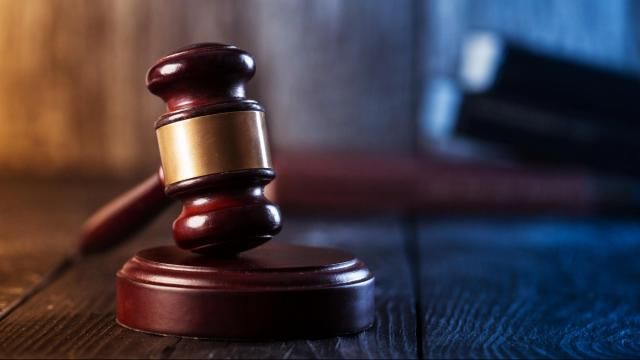Advocates fear reversal on racial justice reforms at North Carolina Supreme Court

After a first-of-its-kind ruling in 2022 acknowledging the negative effects of racial bias on jury selection in North Carolina, the state Supreme Court may now be backtracking.
Two opinions from the state’s highest court last week denied what are known as Batson challenges — in which a defendant can claim their sentencing was unfair. It often comes up in cases in which an all-white jury convicts a Black defendant of murder or another serious crime.
The U.S. Supreme Court created Batson challenges in the 1980s, and many states — including others with long histories of racial inequality — have recognized them.
Courts in North Carolina spent decades without recognizing the validity of a Batson challenge.
Former Republican Supreme Court Justice Bob Edmunds wrote a blog post last year acknowledging the court had never ruled on a Batson challenge. While some took it as a sign that the Supreme Court was reluctant to wade into issues of racial equity, he said, it was for good reason. Instead of ruling on the cases, Edmunds wrote, the Supreme Court would just send them back to trial, “where the issue usually resolved itself.”
That changed last year, when the state Supreme Court overturned an armed robbery conviction due to Wake County prosecutors’ actions during jury selection.
It delighted advocates like Gretchen Engel, who leads the Center for Death Penalty Litigation. The Durham-based group, which opposes the death penalty, represents accused killers in court and works to exonerate wrongfully convicted death row inmates.
“If you have proof beyond a reasonable doubt that the person is guilty, you should be able to try that before any jury,” Engel said.
Now the state’s highest court appears to be going back to its previous stance of denying such challenges. The law hasn’t changed, but the political composition of the court has.
In the various rulings last year, and again this year, the court’s Democratic justices all voted in favor of the defendants and the Republican justices all voted in favor of the prosecutors. Last year the court had a 4-3 Democratic majority, but now it has a 5-2 Republican majority.
“Today, this Court returns to the practice of refusing to acknowledge what is in plain sight and turns a blind eye to evidence of racial discrimination in jury selection in this case by contorting the doctrine and turning the Batson test into an impossible hurdle,” Democratic Justice Anita Earls wrote in her dissent to one of last week’s rulings.
Chief Justice Paul Newby, a Republican, has been consistent on the issue. In 2020 when he was the only Republican on a 6-1 Democratic majority court, he wrote a dissent in an earlier version of one of the cases the court just now issued a final ruling on.
Originally the court’s Democratic justices had been inclined to find racial bias at play in that case, a Cumberland County murder trial, in which prosecutors struck 11 potential jurors — eight of whom were Black. Newby dissented back in 2020, writing that the Democrats made several legal errors in their analysis and also should’ve been deferential to prosecutors.
Then last week, when the same case came back up — this time under a Republican majority — Newby wrote the majority opinion, making many of the same points he had before that dismissed allegations of race being the motivating factor for prosecutors keeping Black people off the jury.
Newby couldn’t immediately be reached for comment beyond his legal writings. A spokesman for the courts system said justices typically don’t comment on issues that could affect current or future cases.
‘Two kinds of justice’
The 2022 ruling, acknowledging that racial bias in jury selection had tainted a trial, had been viewed by advocates for racial equity and criminal justice reform as a potential turning point for North Carolina. In the past, judges from both political parties had shot down such arguments.
But during the Black Lives Matter protests in 2020, the court’s Democratic chief justice, Cheri Beasley — the only Black woman to hold that role — delivered a rare public speech. She acknowledged, bluntly, the continued existence of system racism within the state’s courts.
“In our courts, African-Americans are more harshly treated, more severely punished and more likely to be presumed guilty,” she said. Her statements were supported by public data from the courts system itself.
“Too many people believe that there are two kinds of justice,” Beasley added. “They believe it because that is their lived experience — they have seen and felt the difference in their own lives.”
The court’s Democratic majority later voted in favor of Black defendants in several high-profile criminal justice cases, including that historic Batson case out of Wake County.
Republicans responded by spending millions of dollars in the 2020 and 2022 elections painting Democratic judges as soft on crime. Voters responded by electing a Republican in every statewide judicial election in both years, shifting the Supreme Court from a 6-1 Democratic majority in 2019 to a 5-2 Republican majority in 2023.
Just as Democratic judges appeared moved by Beasley’s public reckoning, Republican judges also reacted strongly. Court of Appeals Judge Jefferson Griffin used a later court opinion to criticize Beasley directly for suggesting that systemic racism exists in the courts system.
“I reject this argument,” he wrote. “The law is color-blind and applies equally to every citizen in the United States of America.”
Griffin, a Republican, is now running to join the state Supreme Court in 2024, angling for the seat held by Democratic Justice Michael Morgan.
But even as the court appears to be reversing course, advocates like Engel still hope last week’s two rulings were anomalies.
Engel noted that while the Supreme Court heard four Batson cases recently it only ruled on two of them. That suggests it’s possible the court is still debating the other two, although it’s impossible to know for certain, given the opaque inner dealings of the court and its secret deliberations.
"I hope these two are not a harbinger of a complete retrenchment on the importance of jury selection,” she said.
The cases involved
Just months after Beasley’s speech on racism in the courts, she lost her 2020 re-election campaign to Newby, the new chief justice.
In the case of one Black juror who prosecutors denied, the defense had argued that prosecutors suspiciously claimed they struck him, not due to his race but because he had a history of mental illness — even though prosecutors did allow a white juror who had a similar history of mental illness. Newby said that was OK because the Black potential juror now works in the mental health field, which might cause him to be more sympathetic to the defendant.
He also noted that there were other similarities between that same Black potential juror, named Humphrey, and a white juror who was seated, named Hardin. Prosecutors said they were skeptical of Humphrey’s work with troubled youth but not with Hardin’s similar work. That was acceptable, Newby wrote, because Hardin worked through a church group and Humphrey did not.
But while Hardin’s work with her church was seen as a positive factor in her favor, prosecutors used a different Black potential juror’s work with his own church against him, claiming they wanted to strike him not because of his race but because of his own Christian ministry work, which sometimes included outreach to young people in “drug-infested areas.”
Newby ended his opinion by noting that the trial court judge who oversaw the case originally didn’t have any problems with the jury selection, and the Supreme Court majority wanted to give broad deference to that original judge.
“The trial court is in the best position to weigh credibility and assess the demeanor of both the prosecutor and the prospective jurors,” Newby wrote.
The other case involved a Columbus County murder trial in which prosecutors struck multiple Black people from the jury. One was a college student they prevented from becoming a juror specifically because she had participated in Black Lives Matter protests.
Engel said that, regardless of whether the Supreme Court will or won’t continue recognizing the issue of racism in jury selection, it’s also paramount that prosecutors stop kicking Black people off juries to begin with.
Even some of the state’s most liberal prosecutors, she said, haven’t touched that issue even as they’ve instituted progressive policies on marijuana arrests and more.
“It would be great to see prosecutors take more leadership on this issue,” she said.









